- Home
- James A. Michener
The Bridges at Toko-ri Page 9
The Bridges at Toko-ri Read online
Page 9
He was determined to find a better refuge before new communists arrived, for the smell in this ditch was becoming too strong to tolerate, but when he did start to run toward the trees he saw four people standing there. Quickly he brandished his revolver at them, but they must have known he could not shoot them from so far for they stood impassively watching.
They were the family from the nearest farm, a mother, father and two children, dressed in discarded uniforms and brandishing rakes. He stopped to see if they intended attacking him, but they remained still and he saw them not as Koreans but as the Japanese family that had intruded upon his sulphur bath that morning in the Fuji-san and an unbearable longing for his own wife and children possessed him and it was then—there in bright sunlight in the rice field—that he knew he would not see his family again.
He was driven from this brief reflection by the arrival of more soldiers. From the very trees to which he was heading appeared eleven guards, shouting in Korean, so he hastily dived back to his stinking ditch where they could not hit him. They launched a methodical encircling attack but before they could bring him under fire four F4U’s appeared overhead, called in by Cag to protect the downed pilot until rescue operations could begin.
Using Brubaker as their focus point, the slow propeller planes established a four-leaf clover in which each flew a big figure eight with such perfect timing as to have one plane coming in over Brubaker at all times, with alternate planes commanding different sectors of land so that no enemy dare approach.
The very first run enabled the F4U men to spot the eleven communists, and with sharp fire they tied the soldiers down. In the respite Brubaker thought, “With such cover a helicopter might make it,” and he began to hope. Then, thinking to find a better spot from which to dash to the copter if it should arrive, he started to move out, but the Korean family saw him and thought he was moving toward them, so they withdrew. The F4U man responsible for this sector spied the Koreans, saw their tattered uniforms and roared upon them, his guns ablaze.
“No!” Brubaker screamed.
“No! No! No!” He waved his arms, jumped wildly to divert the F4U.
But the pilot could not see him. Focusing his sights grimly at what he knew to be the enemy, he brought his fiery guns a few yards from the faces of the Korean family. For one ghastly moment he thought two of the soldiers might have been children, but by then he was far away, roaring back into the four-leafed clover.
Sick, Harry Brubaker stood in the ditch and thought of his own daughters, and his heavy body was cold with much sweat.
He was standing thus when the helicopter appeared. It had lumbered in from the scow, dodging ground fire and flying so low that a revolver bullet could have destroyed it. Smack in the middle of the rice field it landed and Mike Forney got out. He wore his green top hat, a new Baron von Richthofen scarf of Japanese silk and a carbine. Behind him stumbled sad-faced Nestor Gamidge, also with a carbine. Leaving Gamidge at the copter, Forney ran across the rice field shouting, “Relax, Harry! Everything’s under control.”
Brubaker shouted, “Better dodge and duck.”
“Why, is there a war goin’ on?”
“Look!” He pointed toward the trees and as he did so a volley of machine gun fire spattered the helicopter. Gamidge fell to the ground but rolled over several times and indicated that he was all right, but above his head the helicopter burst into flames.
Forney jumped into the ditch and turned back to watch the fire in silence. No other copter would come onto this field. With flames of noon in their eyes the two men in the ditch looked at each other, unable to speak. Then slowly Mike pulled his right foot up.
“Harry,” he asked. “Is this what I think it is?”
“Yep.”
Scornfully he said, “You sure picked a wonderful place to fight a war.” Then he shrugged his shoulders and growled, “We might as well get Nestor in here. Three of us can stand those apes off for days.”
He hefted his carbine nonchalantly and started across the rice field to convoy Gamidge but when the sallow-faced Kentuckian stood up, communist bullets chopped him in the chest and he fell. Mike, still wearing his green hat, blasted the line of trees in pathetic fury, for he must have known his carbine could not carry so far. Then he ran forward to where Nestor lay but soon he crawled back to the stinking ditch and tried not to look at Harry.
“Is he dead?”
“Yep.”
In silence the two men tried to build protection for their faces, but when they reached into the ditch for stones, an evil smell arose, so that Forney stared back at the ditch and muttered, “I could have picked a better ...” Then he said bitterly, “They were goin’ to give Nestor a medal.”
“Why’d you bring the copter in here, Mike?”
“I take care of my men, sir.”
“How is it aboard the scow?” Brubaker phrased the question so as to imply that Forney would be returning there when this day was over.
“It’s fair, but carrier duty spoils you.”
“I liked the Savo,” Brubaker said, and when referring to himself he used the completed tense, surrendering hope.
Forney caught this and said, “You know what kills me right now? Thinking of Kimiko going to bed with that ape from the Essex.”
“That would be tough,” Brubaker agreed.
The two men looked up at the F4U’s and Forney asked, “How much longer will they be able to stay?”
“Not long,” Harry replied.
“Well, we got nothin’ to worry about. The jets’ll be back.”
Harry said, “This morning I had a chance to watch jets in action. They’re terrific.”
“Look at those apes,” Mike said, pointing to where communists were starting to move in. From time to time accurate rifle fire pinked the top of the mound and Brubaker thought ruefully of people back in Denver who visualized communists as peasants with pitchforks who overran positions in mass attacks.
“Those guys know what they’re doing,” he said.
“But they don’t know what they’re gonna meet!” Mike laughed. Then he suddenly looked at Harry and said, “Why didn’t you tell me you didn’t have a carbine.” And before Brubaker could stop him, he dashed across the rice field, grabbed Nestor Gamidge’s carbine and stripped the dead man of ammunition. Two F4U’s, seeing what Mike was doing, roared low and held the communists off while the Irishman dodged and ducked his way back to the ditch.
“Boy, now they’ll know something hit ’em!” he cried as he jammed the weapon into Harry’s hands.
Realization that Mike intended to battle it out here made Harry shiver and he asked, “You think there’s any chance they’d allow us to surrender?”
“Those apes?” Mike asked.
The two Americans piled the last rocks before their faces and Harry asked, “Why do you hate them so much?”
“Simple. One Sunday morning in the cathedral I heard the cardinal explain it all,” Mike said. A bullet zinged into the mud behind them and Mike grabbed Brubaker’s arm. “You understand, sir, I came out here to save you. I don’t want to die. There was a fightin’ chance or I wouldn’t have come. But now we’re here, let’s go down really swingin’.”
He watched one of the communists creep forward for a better shot. “Don’t fire too soon at these apes,” he whispered. He kept his hand on Harry’s arm for at least two minutes. Then, just as the enemy soldier got into position Mike blasted him right in the face. When Mike looked back he saw that Brubaker was busy with his hip knife, slashing away at his poopy suit.
“What are you doin’?” the Irishman exploded.”
“Letting some air in.”
“Have you gone nuts, sir?”
“Ever since I climbed into my first poopy suit I’ve been weighed down. I’ve been sweating and unable to breathe. Like a zombie. Today I want to feel like a human being.” He stripped away large chunks of his burdensome gear and stood reasonably free. “I feel better already,” he said.
M
ike was sure the lieutenant had gone off his rocker but there wasn’t anything he could do about it so he laughed and said, “I’m the same way. I couldn’t fight these apes without my green hat.”
“Why do you wear that?” Harry asked.
“I want people to know I’m around.”
“That’s what you told the captain. But what’s the real dope?”
Mike stopped, looked frankly at Brubaker and said, “When I was a kid we lived. ...” He stopped abruptly and asked, “Tell me the truth, sir, wasn’t that captain a pathetic ape?”
“The way he used windmill all the time.”
“In about three minutes now,” Mike said, pointing to the trees.
The communists moved slowly and with deliberate plan. Four of them came in from the south, three from the mountain quarter. “I’m gonna keep my eye on those four out there,” Mike said.
Some minutes passed and there was a flurry of fire from the three soldiers in the mountain quarter but Forney yelled, “Forget them!” and he was right for the other four lunged forward and tried to overrun the ditch. Calmly Mike and Harry waited until the communists were close upon them. Then they started to fire rapidly. The communists fired back but Mike yelled, “They’re crumblin’,” and he chopped them down.
“’That’ll take care of the boys,” he shouted. “Now bring on the men.” But as he turned to congratulate Brubaker an unseen communist who had sneaked in from the sea quarter hurled two grenades into the ditch. One of them Mike managed to throw back but as he lifted the second it exploded and tore him apart. His body, motivated by the driving forces that had occupied his mind, stumbled forward toward the unseen enemy and pitched into the snow.
Now the sky was empty and the helicopter stood burned out in the rice field and in the ditch there was no one beside him. Harry Brubaker, a twenty-nine-year-old lawyer from Denver, Colorado, was alone in a spot he had never intended to defend in a war he had not understood. In his home town at that moment the University of Colorado was playing Denver in their traditional basketball game. The stands were crowded with more than 8,000 people and not one of them gave a damn about Korea. In San Francisco a group of men were finishing dinner and because the Korean war was a vulnerable topic, they laid plans to lambaste it from one end of the country to the other, but none of them really cared about the war or sought to comprehend it. And in New York thousands of Americans were crowding into the night clubs where the food was good and the wine expensive, but hardly anywhere in the city except in a few homes whose men were overseas was there even an echo of Korea.
But Harry Brubaker was in Korea, armed with two carbines. He was no longer afraid nor was he resentful. This was the war he had been handed by his nation and in the noonday sun he had only one thought: he was desperately in love with his wife and kids and he wanted to see them one more time.
The memory of his family was too much to bear and for an instant he pressed his right hand across his eyes and thought, “The girls will be in the garden now. ...”
He did not complete the picture for the hidden communist who had tossed the grenades had remained close and now with one carefully planned shot sped a bullet directly through the right hand that covered the American’s face. In that millionth of a second, while ten slim Banshees roared in from the sea to resume command of the sky, Harry Brubaker understood in some fragmentary way the purpose of his being in Korea. But the brief knowledge served no purpose, for the next instant he plunged face down into the ditch.
Through the long afternoon that followed, Admiral Tarrant haunted his telephone, waiting word of the miracle that would save his son. When Mike Forney left the scow with his helicopter, the admiral had said, “Well, Mike’ll get him.” Then the leader of the F4U’s reported the copter burning.
Now, from the clandestine broadcaster near Wonsan came the facts: “Jet plane crash. Helicopter crash. Three Americans killed by communist troops.”
Shaken, the lean, hard-bitten admiral left flag plot and walked gravely to his tiny room, for he knew that he must report these facts to Nancy Brubaker, in Yokosuka. But as he stared at the paper he asked, “How do you explain to a wife that her husband has died for his nation? How do you tell that to a woman with two children?” And he thought of his own wife, sitting somewhere in a dark room knitting a child’s garment ... but it was already more than seven feet long.
The job was too much for him. Later, maybe, he would know what to write. Then he thought of the Cag, who had led this ill-starred mission. He burned with fury and summoned the Cag to him, lashing at the bullet-headed commander as soon as he appeared.
“Why was Brubaker abandoned?”
Cag’s eyes were red and tired from too much flying but he controlled his nerves and said, “We kept an air cap over him.”
“If one helicopter crashed, why didn’t you send another?”
“Sir, its not my job to dispatch copters. You ask for volunteers. And there are never enough Mike Forneys.”
“How was Brubaker hit in the first place?”
“He was working over the dumps.”
The admiral pounced on this. “What was he doing at the dumps?”
Patiently Cag explained. “Before we took off we agreed. If we get the bridges, we expend our ammo on the dumps.”
Icily, from the empty bitterness of his bosom, the old man asked, “Was that wise?”
Cag had taken enough. He’d stood this angry old tyrant long enough and there was no promotion in the navy that would make him take any more. “Admiral,” he said grimly, “this was a good mission. We did everything just right. I put Brubaker in charge of the third division because I could trust him to fly low and bore in with his bombs. He did just that.”
Cag, trembling with anger, rushed on, “Admiral, everybody in the air group knows that you selected Brubaker as your special charge. You do that on every command and we know why you do it. Some kid your own boy’s age. So today I led your boy to death. But it was a good mission. We did everything just right. And it was your boy who helped destroy the bridges. Admiral, if my eyes are red it’s for that kid. Because he was mine too. And I lost him.”
The old man stood there, staring stonily at the shaking commander with the bullet head while Cag shot the works. “I don’t care any longer what kind of fitness report you turn in on me because this was a good mission. It was a good mission.” Without saluting he stormed from flag country, his fiery steps echoing as he stamped away.
For many hours the admiral remained alone. Then toward morning he heard the anti-submarine patrol go out and as the engines roared he asked, “Why is America lucky enough to have such men? They leave this tiny ship and fly against the enemy. Then they must seek the ship, lost somewhere on the sea. And when they find it, they have to land upon its pitching deck. Where did we get such men?”
He went out to watch the launching of the dawn strike. As streaks of light appeared in the east, pilots came on deck. Bundled like animals awakened from hibernation, they waddled purposefully to their jets. The last to climb aboard was Cag, stocky and round like a snowball. He checked each jet, then studied his own. Finally, as if there were nothing more he could do, he scrambled into his plane and waited. Majestically, the task force turned into the wind, the bull horn jangled and a voice in the gloom cried, “Launch jets.”
Admiral Tarrant watched them go, two by two from the lashing catapult, planes of immortal beauty whipping into the air with flame and fury upon them. They did not waste fuel orbiting but screamed to the west, seeking new bridges in Korea.
THE END.
About the Author
James A. Michener was born in 1907 and raised by a Quaker woman in Pennsylvania. During World War II he served with the U.S. Navy and traveled across the Pacific. His TALES OF THE SOUTH PACIFIC won the Pulitzer Prize in 1947. He lives with his wife in Coral Gables, Florida and is a professor at the University of Miami.
(Series: # )

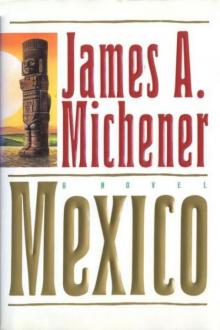 Mexico
Mexico The World Is My Home: A Memoir
The World Is My Home: A Memoir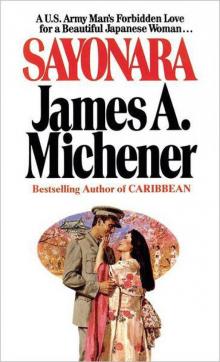 Sayonara
Sayonara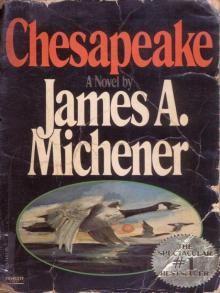 Chesapeake
Chesapeake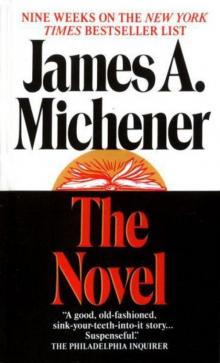 The Novel
The Novel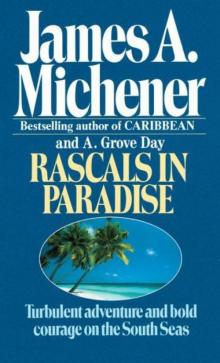 Rascals in Paradise
Rascals in Paradise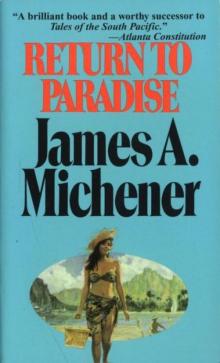 Return to Paradise
Return to Paradise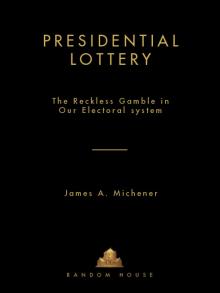 Presidential Lottery: The Reckless Gamble in Our Electoral System
Presidential Lottery: The Reckless Gamble in Our Electoral System The Source
The Source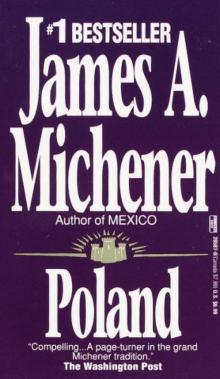 Poland
Poland Space
Space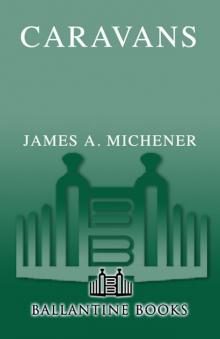 Caravans
Caravans Creatures of the Kingdom: Stories of Animals and Nature
Creatures of the Kingdom: Stories of Animals and Nature Iberia
Iberia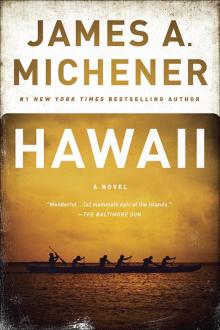 Hawaii
Hawaii The Watermen: Selections From Chesapeake
The Watermen: Selections From Chesapeake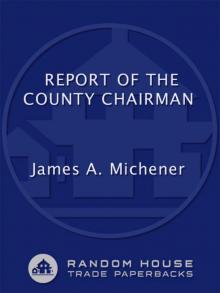 Report of the County Chairman
Report of the County Chairman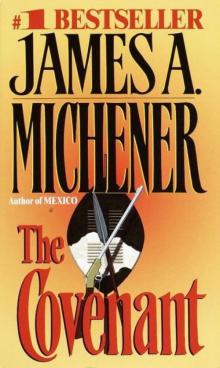 The Covenant
The Covenant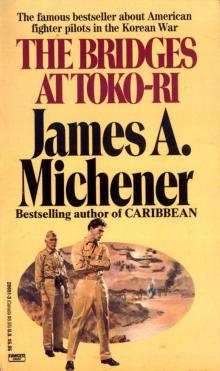 The Bridges at Toko-ri
The Bridges at Toko-ri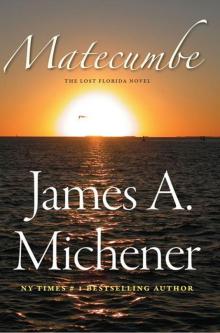 Matecumbe
Matecumbe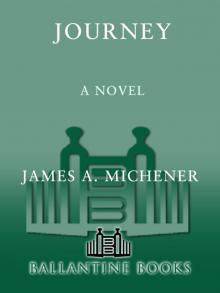 Journey: A Novel
Journey: A Novel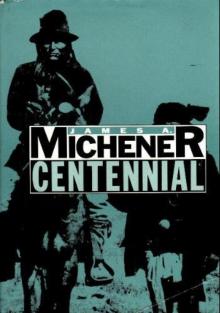 Centennial
Centennial Sports in America
Sports in America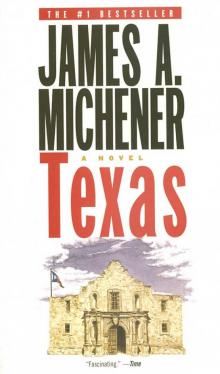 Texas
Texas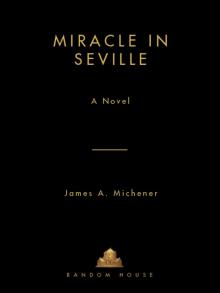 Miracle in Seville
Miracle in Seville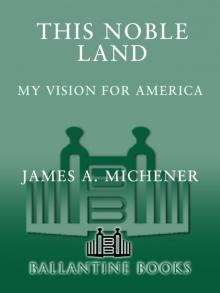 This Noble Land: My Vision for America
This Noble Land: My Vision for America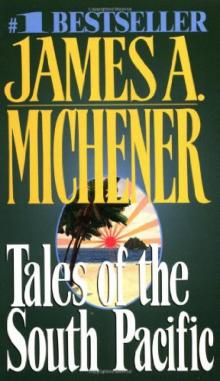 Tales of the South Pacific
Tales of the South Pacific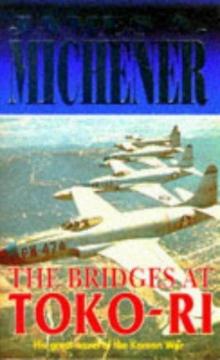 Bridges at Toko-Ri
Bridges at Toko-Ri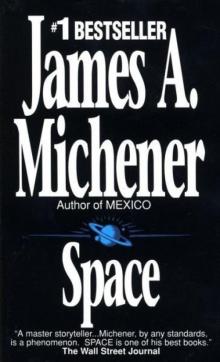 Space: A Novel
Space: A Novel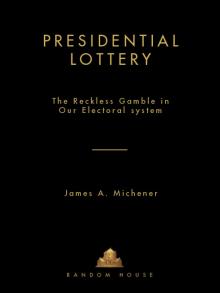 Presidential Lottery
Presidential Lottery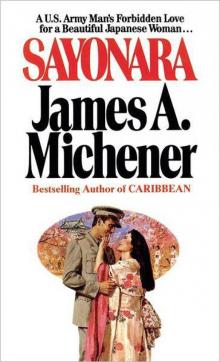 Sayonara: A Novel
Sayonara: A Novel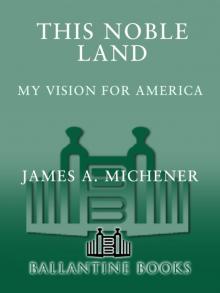 This Noble Land
This Noble Land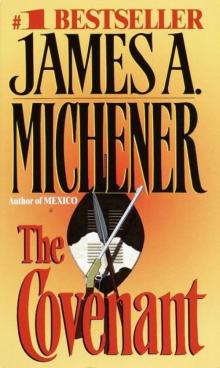 The Covenant: A Novel
The Covenant: A Novel Miracle in Seville: A Novel
Miracle in Seville: A Novel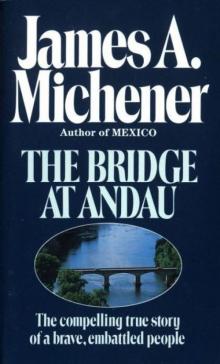 The Bridge at Andau
The Bridge at Andau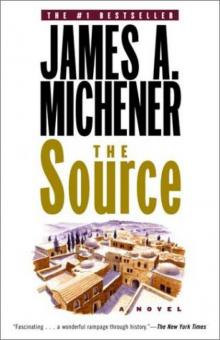 Source
Source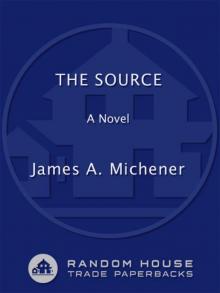 The Source: A Novel
The Source: A Novel Journey
Journey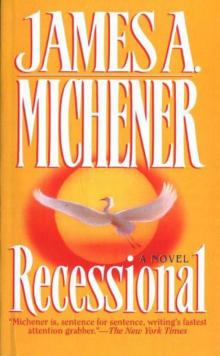 Recessional: A Novel
Recessional: A Novel Legacy: A Novel
Legacy: A Novel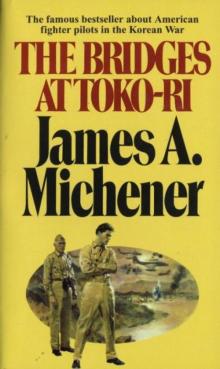 The Bridges at Toko-Ri: A Novel
The Bridges at Toko-Ri: A Novel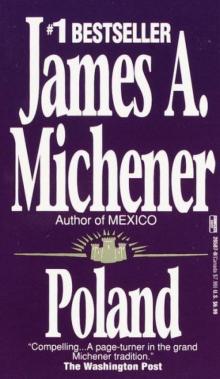 Poland: A Novel
Poland: A Novel